Anti-paedophile police fight child porn 'epidemic'
- Published
Angus Crawford joins US authorities on a raid on a child pornography suspect
The internet trade in images that show child sex abuse is now "an epidemic", according to the head of the global initiative to combat the problem.
Police officers from around the world serve on the Virtual Global Taskforce.
Its chairman, Ian Quinn, tells the BBC there has been an "explosion" in cases handled by US authorities.
The US alone has 61 Internet Crimes Against Children (ICAC) units, each made up of state, local police and federal agents.
BBC News joined a recent operation in Los Angeles.
Twenty one officers were briefed at dawn in a parking lot in central LA.
Lt Andrea Grossman, from the Los Angeles Police Department, told us they conducted such operations "three to five times per week".
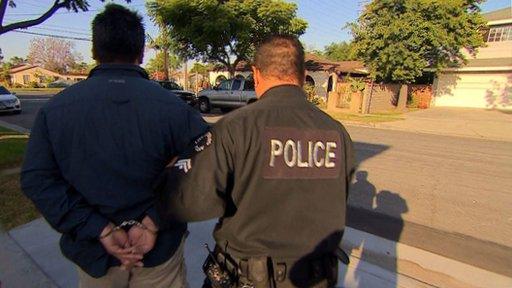
A man was arrested as a result of the Los Angeles operation
The amount of images of child sexual abuse on the internet, she says, is "beyond out of control, we're now just getting to the surface of it".
Their target was a man who had tried to send obscene images via his Gmail account.
The team was led by an officer holding a pump-action shotgun, backed up by others with an assault rifle and hand guns.
A suspect was detained.
The man's computer was analysed in a mobile laboratory, housed in a large camper van parked outside the address.

Online images accumulate
In 2002 the US National Center for Missing and Exploited Children reviewed and confirmed 45,055 examples of obscene images of children found online (some of these were duplicates)
In 2013 the figure had grown to 23,881,197
As of May 2014, the centre had reviewed 112 million files containing images of child sexual abuse

In the past computer equipment had to be sent away for analysis, which could take months.
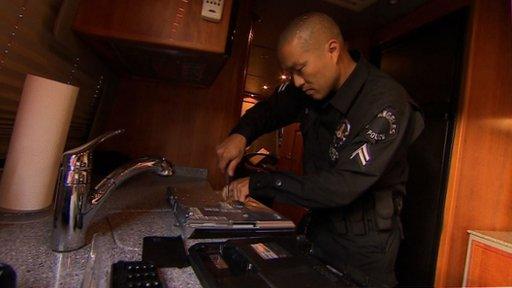
Officers removed the suspect's hard drive and analysed it in a mobile laboratory
But now within minutes of his arrest officers had found images of the abuse of children as young as six-years-old.
He was charged with possessing illegal material.
Operation Predator
The US Department of Homeland Security investigations (HSI) launched more than 4,000 investigations into online child sexual abuse last year.
"Globally there's not a country that can hide from this crime," says Mr Quinn.
To combat the problem department launched Operation Predator in 2003, with three key aims:
to rescue children
to prosecute their abusers
to stop the trade in obscene images

Investigators have repaired mobile phone chips to analyse the images they hold
Predator has led to more than 1,000 arrests across the world in the past six months, 29 of those were in the UK.

Predator detentions
In 2003, 339 arrests were made worldwide in connection with Operation Predator
In 2013, the number had grown to 2,099
To date, the total number of arrests linked to the operation totals 10,608

Lt Grossman says paedophiles trade images across the world, which demands a global response from law enforcement.
"Your suspects are our suspects, your victims are our victims," she says.
"I start my day at 04:00, so I can talk to the Brits, the Australians, to any international partner."
Her team also has access to software that can track in real time paedophiles accessing images on peer-to-peer networks.
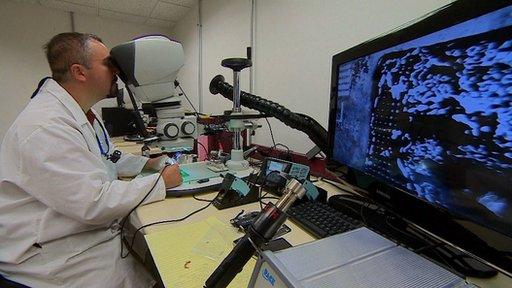
Computer forensic experts help gather evidence to prosecute suspected paedophiles
Earlier this year Lt Grossman and a colleague were in London training 100 British detectives from across the UK.
They taught their UK counterparts advanced techniques for tracking suspects online and gathering evidence.
British arrest
The cooperation between the US and UK has led to some high profile arrests.
Earlier this year a British man called Mark Luscombe was jailed after an operation which began in the US.
Luscombe, 29, of Verwood, Dorset, used a paedophile chat room online.
He contacted an undercover agent from Homeland Security who was posing as a man offering his children for sex.
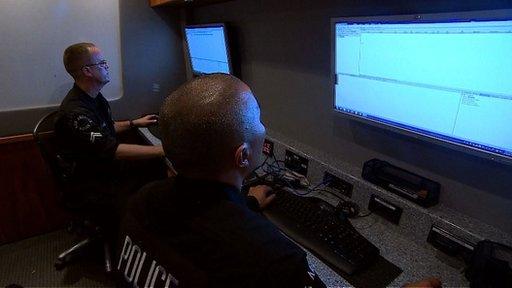
Some paedophiles have been found with thousands of illegal images on their computers
The 29-year-old offered to send the officer indecent images of children in exchange for watching a girl being abused live on a webcam.
Luscombe was sentenced to five years in jail after pleading guilty to 16 offences at Bournemouth Crown Court.
BBC News has obtained access to his police interview tapes.
In them Luscombe tells officers that he thought he might be under surveillance.

Mark Luscombe was caught in an operation by US and UK police
"I know I probably spoke to one of you and that's how you probably got me," he said.
He also admitted that he needed help.
"I've always felt this way, I know it's bad and wrong... it's just wired up."
Detective Superintendent Chris Naughton from Dorset police believes this conviction sends a powerful message.
"From us receiving the information to going through his door was about 48 hours," he says.
"I think that shows how well [international cooperation] works."
Undercover agent
Homeland Security regularly deploys undercover officers online.
Special Agent Kevin Laws has been doing the job for a decade and has made 60 arrests.
He poses on incest chat rooms as a father offering his children for sex with other adults.
"This is as bad as it gets," he tells us.
He gets frequent requests from people who want to meet him and abuse the fictitious children, including people from the UK.
"Oh every day, it's a rare time I don't speak to someone in the UK," he says.
He admits that his work is like "a drop of sand in the ocean", but that it does send a clear message to abusers.
"We might not get you today or tomorrow, but we will get you, and it will be when you least expect it."
- Published14 April 2014
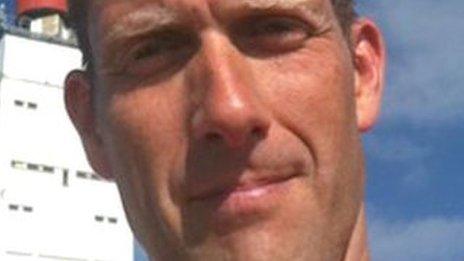
- Published29 January 2014

- Published20 October 2013
